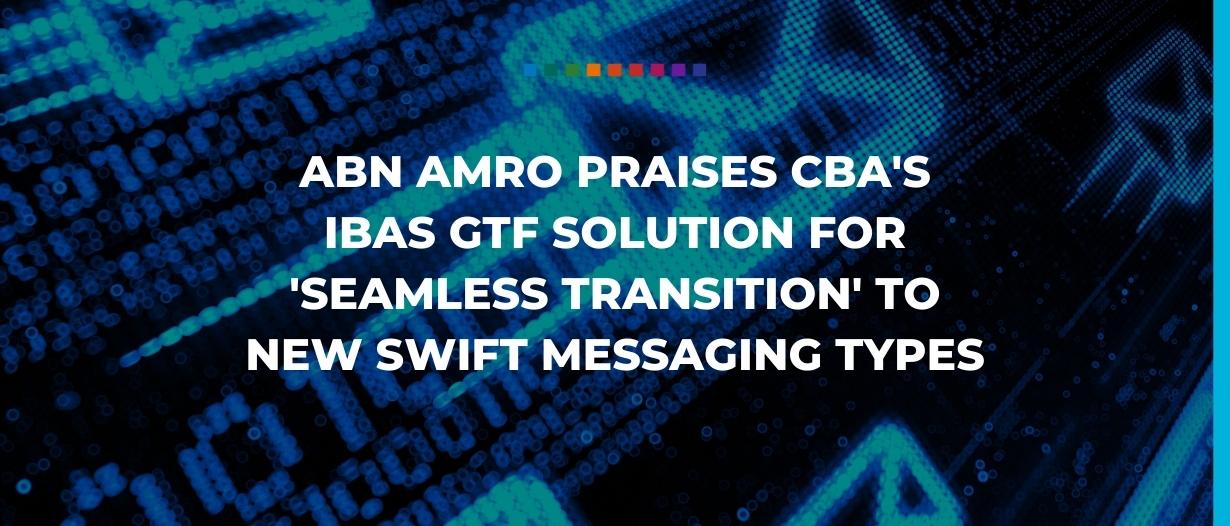ABN AMRO Bank has said that it was rewarded for its early preparation for SWIFT trade finance changes, thanks to a solution from Norwegian software vendor Commercial Banking Applications (CBA).
The Dutch bank is among the CBA clients that have successfully transitioned to new structured and more complex message formats for guarantees and standby letters of credit (LCs).
CBA has confirmed that its IBAS GTF – Global Trade Finance Factory solution enabled the “seamless transition” to the new structured message formats included in the latest SWIFT Release 2021.
ABN AMRO Bank was one of several clients to successfully complete the switchover in November 2021 using CBA’s IBAS solution.
Frans Westdorp, product owner for trade finance core systems, reporting, and enablement at ABN AMRO Bank, said the transition was the biggest change to trade finance that he has seen in his career.
“We’re absolutely thrilled that everything went so smoothly, both around the immediate switchover date and in the weeks that followed,” he said.
“The changes involved in this transition were numerous and complex, affecting the whole trade finance transaction flow from the customer front-end through to back-office workflows, third-party transaction monitoring, quality control, and master data management.
“This made it essential to work closely with our technology partner, CBA, to plan and test all workflows in advance.”
After first making a preliminary version of the new IBAS release available to IBAS user banks in a cloud environment, CBA then released its IBAS GTF solution in early June 2021, allowing additional time for testing in advance of the planned SWIFT changes.
Banks needed to ensure that all back-office applications, front-end systems, APIs, and other interfaces were prepared for the move away from unstructured messages to more complex and structured message types that allow for increased automation and straight-through processing.
In a press statement, CBA said that IBAS GTF optimises the business logic associated with handling the new requirements for standby LCs, which must now always be issued, advised, and amended using the same message type as guarantees.
The front-end customers are guided through the submission process, helping them understand the nature of the standby LC transaction and how it differs to a guarantee.
Similarly, at the back end, bank staff benefit from software that is SWIFT-compliant and tailor-made, in line with standby LC market practice.
As noted by CBA, this makes the entire process more transparent and straightforward for all parties involved.
Rolf Hauge, CEO and founder of CBA, said: “ABN AMRO Bank’s global trade finance operations – supported by CBA’s IBAS GTF platform – are very sophisticated and highly automated.
“It was critical that the bank could seamlessly transition to SWIFT’s new complex message types with no impact on its day-to-day operations.
“The bank uses our software on a multi-country basis, and I’m pleased to say that its customers around the world, equipped with our front-end, have not experienced any impact in how they conduct their trade finance transactions.
“Even if the result of a guarantee or standby letter of credit request is a highly structured and complex SWIFT message, it is important that the complexity does not burden the bank’s customers or employees.
“IBAS does all the heavy lifting in terms of automatically translating customer requirements for guarantees and standby LC requests into the required formats.”
Westdorp added: “To sum up, IBAS GTF gives ABN AMRO Bank the best of both worlds: simplicity – not impacting the customer or the bank’s operations – and complexity, allowing the bank to increase automation and explore opportunities associated with more structured message types.
“Usually, there is a trade-off between simplicity and complexity in software solutions, but thanks to the sophisticated business logic in IBAS, we are delighted to have been able to achieve both.”
 Australia
Australia Hong Kong
Hong Kong Japan
Japan Singapore
Singapore United Arab Emirates
United Arab Emirates United States
United States France
France Germany
Germany Ireland
Ireland Netherlands
Netherlands United Kingdom
United Kingdom






Comments are closed.